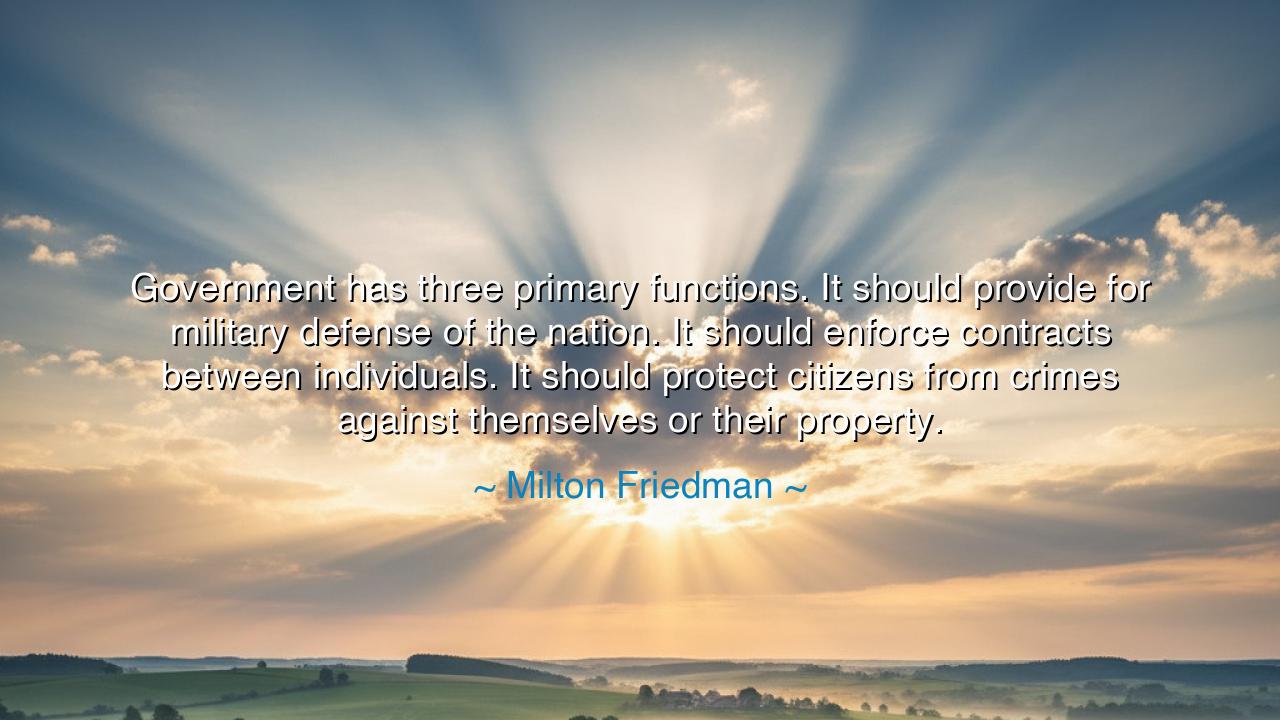
Government has three primary functions. It should provide for
Government has three primary functions. It should provide for military defense of the nation. It should enforce contracts between individuals. It should protect citizens from crimes against themselves or their property.






"Government has three primary functions. It should provide for military defense of the nation. It should enforce contracts between individuals. It should protect citizens from crimes against themselves or their property." — Milton Friedman
In this clear and commanding declaration, Milton Friedman, the sage of liberty and reason, distills the vast machinery of the state into its rightful and essential purpose. He reminds us that government, though necessary, is not to be the master of men’s dreams, nor the architect of their happiness, but their guardian — a shield, not a shepherd. Its duties are few, its boundaries firm. It exists to defend, to enforce justice, and to protect. Beyond these, every reach of government’s hand risks trespassing into the sacred ground of freedom, where the soul of man must be left to govern itself.
Friedman lived in the twentieth century — an age both brilliant and perilous — when the world, weary from wars and economic ruin, turned again and again to governments to save it. Empires rose, promising safety through control, and fell beneath the weight of their own excess. In that storm of ideologies, Friedman spoke as a modern prophet of liberty, warning that when government grows beyond its rightful sphere, it begins to devour the very freedoms it was meant to guard. Thus he returned us to the ancient truth: that power, even when benevolent, must be bounded by law and humility.
The first duty, he says, is military defense of the nation. This is the outer wall, the shield of steel that keeps the wolf from the gate. No people can build art, commerce, or wisdom beneath the shadow of invasion. From the legions of Rome defending the frontier to the soldiers who stood on the beaches of Normandy, history teaches that freedom survives only when courage guards it. Yet even this power, though necessary, must be tempered with restraint; for the sword that guards the nation must never turn inward to rule it. Defense, yes — domination, never.
The second duty, Friedman declares, is to enforce contracts between individuals. This is the covenant of civilization — the law that gives weight to a man’s word and safety to his labor. Without such enforcement, trust decays and trade becomes plunder. In the bustling markets of ancient Athens, or the guild halls of medieval Europe, civilization flourished where promises were sacred and justice impartial. When governments uphold the sanctity of honest exchange, they unleash the creative force of mankind — the freedom to build, to trade, to prosper. But when they meddle or favor the few over the many, corruption festers, and the golden promise of commerce turns to dust.
The third and final duty is to protect citizens from crimes against themselves or their property. Here lies the very heart of the social contract. The farmer must sleep knowing his field will not be stolen, the merchant must walk without fear that the law will abandon him to thieves. For what is liberty if not the right to live and labor without the shadow of violence? The city that cannot protect its people soon decays into fear and vengeance, and in such darkness, tyranny is born. Protection of life and property, therefore, is not merely the work of police and courts — it is the preservation of civil peace, the soil from which all prosperity grows.
Consider the example of the United States at its founding, when the new republic was fragile and poor. The Constitution, written in the ashes of revolution, sought to balance liberty and power. The framers, like Friedman centuries later, believed that government’s strength must be limited to its rightful ends. They feared the swelling tide of authority that could drown the citizen’s spirit. And so they bound the government’s hands with law — that the people might remain unbound in thought and endeavor. When that balance has been kept, the nation has prospered; when it has been broken, liberty has trembled.
Friedman’s teaching burns with quiet wisdom: the role of government is not to make men moral, nor to make them equal in station, but to keep the peace that allows each to pursue his own good. The moment it seeks to shape their souls, to command their choices, it ceases to be a servant and becomes a master. Freedom is fragile — too much order smothers it, too little chaos consumes it. True governance walks the narrow path between these extremes, wielding authority not as a weapon, but as a balance.
Lesson: The just government is the one that knows its limits — defending its people, upholding their agreements, and protecting them from harm, but never presuming to rule their hearts or guide their destinies.
Practical Action: Cherish and defend this balance. Support laws that keep power within its rightful sphere. Question every act of authority that claims to “save” you by diminishing your freedom. Uphold honesty in your dealings, courage in your defense of justice, and vigilance in your stewardship of liberty. For a government restrained by wisdom is the fortress of the free; but a government without limits is the shadow of despotism waiting to fall.






AAdministratorAdministrator
Welcome, honored guests. Please leave a comment, we will respond soon